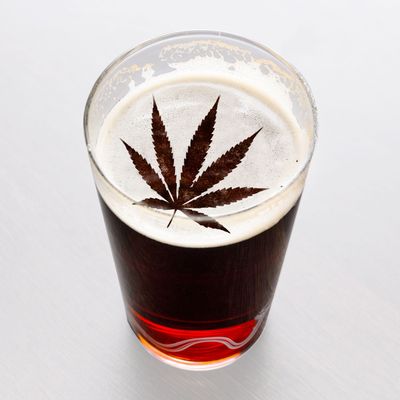
Imagine meeting friends for a beer and choosing your drink not by style or brewer, but by the effect you want the beer to have on your body: an option to make you happier, or calmer, or more energetic. This is the dream of Keith Villa, the brewer that created Blue Moon, and one of the big ideas behind his new company, Ceria Beverages. Ceria isn’t a traditional brewery, but is instead focused on making cannabis beer, a nonalcoholic drink that will nevertheless leave you in a state of (gently) altered consciousness. Villa thinks Ceria will do for marijuana beer what his Blue Moon did for craft beers tastefully garnished with orange slices. He might actually be right.
By the start of next year, Ceria will release a THC-infused lager, IPA, and witbier. Villa partnered with a Denver cannabinoid research company called Ebbu that, he says, can isolate compounds in order to trigger specific sensations in the body. “Our light beer will have a low dose of THC so people can drink several without getting stoned,” he says, comparing it to Bud Light. “Or if they want a stronger sensation, they can get our IPA. It will be equivalent to a regular IPA — have two, enjoy a decent buzz.” All this, according to THC beer advocates, will happen without hangovers or the threat of a beer gut.
Villa is hardly alone in his pursuit, as the legal(ish) pot industry and beer industry have been on a collision course for years now. Pot smoking is a dying trend. Edibles sales, meanwhile, are white-hot, and industry insiders predict beverages will be the largest sector by far. Meanwhile, analysts estimate the beer industry could lose $2 billion a year if pot keeps siphoning off sales. But brewers — a demographic long partial to weed — have realized a solution is staring them in the face: nonalcoholic “beer” made with marijuana, which just so happens to be a close genetic cousin of hops (a crucial ingredient in traditional beer). Both hops and cannabis affect brain function, and both share the same terpenes, the citrusy-piney punch that will be familiar to anyone who loves double IPAs.
“A lot of beer brands are realizing they’re in a great spot,” says Dooma Wendschuh, CEO of Province Brands, a Canadian start-up that in a few months will introduce the world’s first beer brewed with raw marijuana plants. Like all of these new THC beers, Province’s products promise to be hangover-less, low-calorie, and engineered so the dose-response curve is comparable to regular beer. The idea is to make them a go-to option for people who want a social dose, essentially replacing edibles. “Nobody,” Wendschuh says, “wants to meet the guys after work and eat a plate of gummy bears.”
To make its beer, Province uses the plant’s stalks, stems, and roots instead of oils or extracts. The process involves mashing beer as if the marijuana were barley or another grain, then removing the alcohol as if it were an O’Doul’s. The method, needless to say, is tricky. When they shopped their plan around to top brewers almost two years ago, Wendschuh explains, everyone balked. “They said, ‘This won’t work. Cannabis doesn’t have carbs, and you need carbs for mashing. What are you going to be using?’” And to be fair, the earliest test batches weren’t promising: They tasted like rotten broccoli and would have cost roughly $60 a bottle. Eventually, Wendschuh says, he worked with chemical experts to iron out the kinks, and will have the first batches available next year.
The race to be first to market is real: Earlier this week, Cannabiniers, a company based in San Diego, announced the release of its own THC-infused beer. The five nonalcoholic styles rolled out in Nevada dispensaries with eventual plans to debut in California and other pot-friendly states.
Big Beer, meanwhile, isn’t sitting on the sidelines. Constellation Brands, the U.S. owner of Corona and Modelo, invested $190 million last fall for 10 percent of Canopy Growth, a billion-dollar marijuana company that trades under the stock symbol “WEED.” Last week, it turned heads by upping that investment by another $4 billion. And Molson Coors, the world’s seventh-largest brewer, has announced a joint venture with another marijuana company, HEXO, that will produce its own weed-laced beverages.
Last year, Lagunitas, which is owned by Heineken, made its own terpene-infused IPA called SuperCritical, named for the extraction method used to produce cannabis oil. It was a one-off, but a few weeks ago Lagunitas also debuted the industry’s first nonalcoholic THC sparkling water, Hi-Fi Hops — basically, a beer-flavored LaCroix that’s infused with pot. It has no booze, sugar, or calories. Cans, which are currently available in California dispensaries, cost $8 and come in two doses: 5 milligrams each of THC and CBD, or 10 milligrams of THC. It apparently takes about 15 minutes for the psychoactive effects to kick in. Ronald den Elzen, the CEO of Heineken’s U.S. arm, observed at an industry conference in October that “marijuana is being legalized in many states,” and that means, “we have to act now, and we have to do it together.”
Laws, as you might expect, remain difficult to navigate, but the brewers who make THC beers aren’t waiting. Villa wants the laws loosened, obviously, but also knows that if the federal government relaxes rules for things like hemp or CBD, there would inevitably be an industry-wide stampede into cannabis. “It’s going to come at us like a tidal wave,” he predicts, “which is why we’re getting in front of it now.”




